
Movement of Polish Nationalists Zadruga was a Polish neopagan nationalist movement.

Movement of Polish Nationalists Zadruga was a Polish neopagan nationalist movement.
It was founded in 1937 by Jan Stachniuk. It published a monthly political and cultural bulletin Zadruga. The group that coalesced around this bulletin was the most active neopagan group during the 1918–1939 period in Poland, with around 300 followers in 1939. However, the Zadruga movement never formalized its membership.
During 1945–1947, as part of the Nationalist opposition, Zadruga published the Zryw in Poznań and Arkona journals in Bydgoszcz. The movement leaders were arrested in 1949 by the Communist regime, accused of collaboration with Neo-Fascists, and were imprisoned in 1952.
After the amnesty in 1956, they were released. Rather than resume their former activities, they transformed into an informal intellectual movement, based in Wrocław. Attempts in the 1980s and 1990s to revive the association were not successful.
After 1989 the elements of Zadruga were used by Bolesław Tejkowski in his ideology of Polish anti-clerical nationalism of the Social-National Union (Unia Społeczno-Narodowa). [1] The ideology was propagated separately by the Toporzeł Publishing House. [2] Many former participants of the informal Zadruga intellectual groups became members of the National Movement (Ruch Narodowy) or of the Nacjonalistyczne Stowarzyszenie Zadruga. [3]
The foundational writings of Stachniuk and Wacyk are used now by certain Polish Slavic native faith groups, especially by the Union of Native Faith (Rodzima Wiara) and by the Association for Tradition and Culture "Niklot" (Stowarzyszenie na rzecz Tradycji i Kultury „Niklot”):. [4]
| Part of a series on |
| Slavic Native Faith |
|---|
 |
Its spiritual guide was Antoni Wacyk, who promoted a return to Slavic native faith. Stachniuk promoted an ideology of culturalism, aiming at the unification of Western Slavic peoples based on the reconstruction of their original national culture. Stachniuk believed that Christianity, especially the Catholic clergy, presented an anti-cultural influence and promoted a culture of laxism, [5] escapism, and consumption. [6] It was believed that unification under the Slavic native faith would prepare these nations for an inevitable confrontation with Russian and German expansionism and that each nation would build its own strength through its collective matrix (a term used in zadruga), after the original Slavic notion of the organization of rural communities. According to the movement, the Western Slavic nations should function as one centralized state with the collective ownership of land and industry, based on grass-roots enthusiasm and heroism.
Stanisław Potrzebowski, the founder of Rodzima Wiara and zadrugist, noticed the influence of the Zadruga movement on Slavic Native Faith, as described in his book Slavic movement Zadruga. He stated that Zadruga and Slavic Native Faith were linked by a common set of values. He expressed an appreciation of the work of Zdzisław Słowiński, founder of Toporzeł Publishing House, which triggered the rebirth of zadrugist thought in the Third Polish Republic from Polish and Ukrainian Rodnover groups. [7] According to Potrzebowski, the founding of World Congress of Ethnic Religions (later European Congress of Ethnic Religions) in 1998 in Vilnius, coincided with Stachniuk's dream of the "renovation of Aryan people's unity" [8] and a number of joint initiatives of Rodnovers from different countries. For example, the Generic Weche of Slavs is a realization of the social-political program of pre-war Zadruga. [9]
Prav (Правь), Yav (Явь) and Nav (Навь) are the three dimensions or qualities of the cosmos as described in the first chapter of the Book of Light and in the Book of Veles of Slavic Native Faith (Rodnovery). Older sources mention only Nav and Yav concepts of ancient slavic cosmology, similar to Yin and Yang in Taoism, and Prav was not part of the concept. The literal meanings of the Prav, Yav, and Nav words, are, respectively, "Right", "actuality" and "probability". They are also symbolised as a unity by the god Triglav. Already Ebbo documented that the Triglav was seen as embodying the connection and mediation between Heaven, Earth and the underworld / humanity; these three dimensions were also respectively associated to the colours white, green and black as documented by Karel Jaromír Erben.
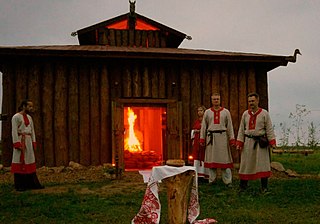
The Slavic Native Faith, commonly known as Rodnovery and sometimes as Slavic Neopaganism, is a modern Pagan religion. Classified as a new religious movement, its practitioners hearken back to the historical belief systems of the Slavic peoples of Central and Eastern Europe, though the movement is inclusive of external influences and hosts a variety of currents. "Rodnovery" is a widely accepted self-descriptor within the community, although there are Rodnover organisations which further characterise the religion as Vedism, Orthodoxy, and Old Belief.

Native Polish Church or The Native Church of Poland, Rodzimy Kościół Polski (RKP) – a West Slavic pagan religious association that refers to ethnic, pre-Christian beliefs of the Slavic people. The religion has its seat in Warsaw. Temples gathering local believers are spread throughout the country, The RKP was registered with the Polish Ministry of the Interior's registry of denominations and churches in March 1995.
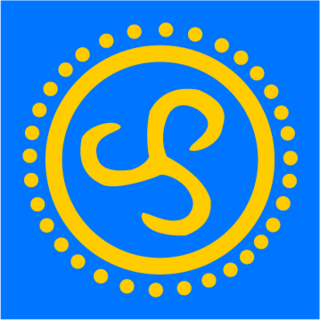
Rodzima Wiara is a Polish Rodnover religious organization, founded in 1996 by Stanisław Potrzebowski in Wrocław as Zrzeszenie Rodzimej Wiary. The name was changed to the current one in 2000.

Like in other nations across the world, there are several far-right organizations and parties operating in Poland.

Stanisław Potrzebowski is the founder and Naczelnik (leader) of Rodzima Wiara, a Polish rodnover organisation, and of the European Congress of Ethnic Religions.
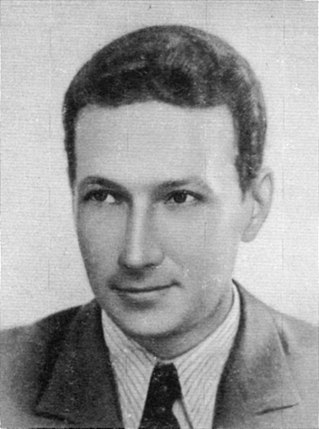
Jan Stachniuk was a Polish philosopher, an editor-in-chief of the Polish pre-war nationalist journal Zadruga, the creator of the Zadruga Movement, a theoretician and the founder of culturalism.
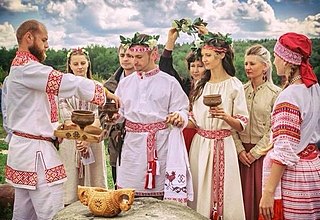
Slavic Native Faith or Slavic Neopaganism in Russia is widespread, according to some estimates from research organisations which put the number of Russian Rodnovers in the millions. The Rodnover population generally has a high education and many of its exponents are intellectuals, many of whom are politically engaged both in the right and the left wings of the political spectrum. Particular movements that have arisen within Russian Rodnovery include various doctrinal frameworks such as Anastasianism, Authentism, Bazhovism, Ivanovism, Kandybaism, Levashovism, Peterburgian Vedism, Slavic-Hill Rodnovery, Vseyasvetnaya Gramota, the Way of Great Perfection, the Way of Troyan, and Ynglism, as well as various attempts to construct specific ethnic Rodnoveries, such as Krivich Rodnovery, Meryan Rodnovery, Viatich Rodnovery. Rodnovery in Russia is also influenced by, and in turn influences, movements that have their roots in Russian cosmism and identify themselves as belonging to the same Vedic culture, such as Roerichism and Blagovery.
The Slavic Native Faith in Ukraine has an unspecified number of adherents which ranges between the thousands and the tens of thousands.

Slavic Native Faith and Christianity are mutually critical and often directly hostile to each other. Among the Slavic Native Faith critiques are a view of religious monotheism as the root of mono-ideologies, by which is meant all ideologies that promote "universal and one-dimensional truths", unable to grasp the complexity of reality and therefore doomed to failure one after the other. These mono-ideologies include Abrahamic religions in general, and all the systems of thought and practice that these religions spawned throughout history, including both Marxism and capitalism, the general Western rationalistic mode of thinking begotten by the Age of Enlightenment, and ultimately the technocratic civilisation based on the idea of possession, exploitation and consumption of the environment. They are regarded as having led the world and humanity to a dead-end, and as destined to disappear and to be supplanted by the values represented by Rodnovery itself. To the "unipolar" world created by the mono-ideologies, and led by the American-influenced West, the Rodnovers oppose their political philosophy of "nativism" and "multipolarism".

In the Russian intellectual milieu, Slavic Native Faith (Rodnovery) presents itself as a carrier of the political philosophy of nativism/nationalism/populism (narodnichestvo), intrinsically related to the identity of the Slavs and the broader group of populations with Indo-European speaking origins, and intertwined with historiosophical ideas about the past and the future of these populations and their role in eschatology.
Slavic Native Faith in Poland has in 2007, according to Scott Simpson, between 2000 and 2500 "actively engaged and regular participants". In 2020, Konrad Kośnik and Elżbieta Hornowska estimated that Rodnovers in Poland were between 7000 and 10,000.
Zdzisław Harlender was a Polish pilot, army officer and writer.
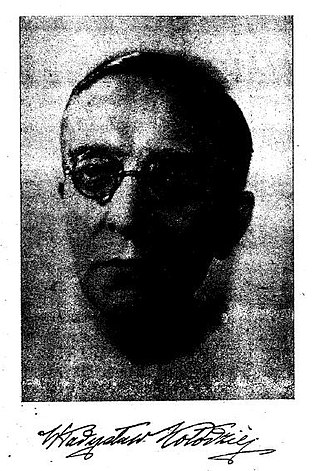
Władysław Kołodziej was a pioneer of modern Paganism in Poland.

Festival of Perun, Perun's Day, Perunica is a Slavic festival in honor of the god Perun celebrated by modern Slavic neopagans (rodnovers); its existence in times before the Slavs began to be Christianized remains hypothetical.

Mono-ideologies are a concept in Russian political and philosophical discourse.
{{cite book}}: CS1 maint: location missing publisher (link)[ full citation needed ]